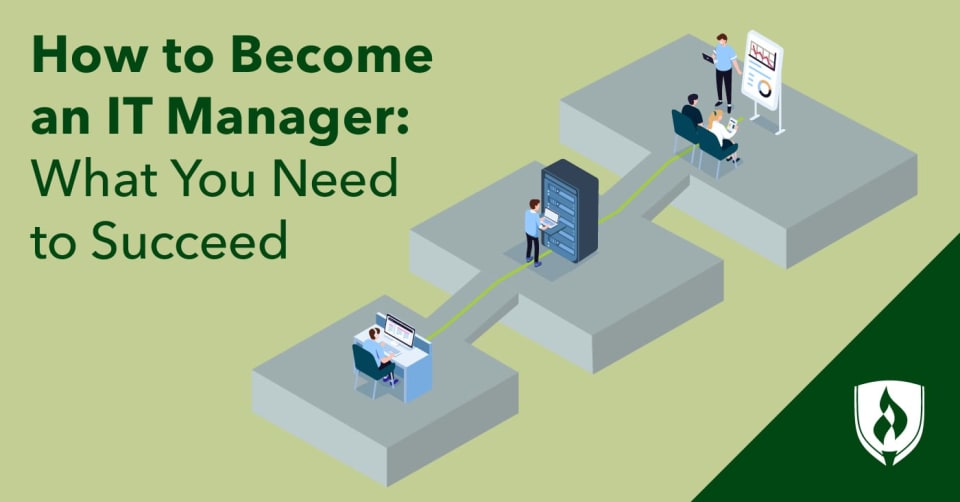
You’ve worked hard to carve out a decent living in your entry-level IT job. But now you have a family, and the bills are growing as quickly as your kids are. Those groceries, extra-curricular activities and braces on the horizon aren’t cheap—so you’ve got your eyes on figuring out how to take the next step up in your career.
It might be time to advance in your career now that you’re a more seasoned professional. Naturally, you might wonder how to become an IT manager. To help you understand the path to this position, we’ve laid out many of the requirements for management positions in IT.
We gathered a combination of expert insight, government information and real-time market intelligence to determine the three things you need to propel your career forward: skills, experience and an IT manager-caliber of education. But first, let’s cover the basics. Exactly what is an IT manager?
What does an IT manager do?
While many other high-level IT positions require specializing in an advanced, technical skill, IT management is all about people skills. You’ll still need enough technical knowledge to communicate effectively with your staff, but your main priorities will likely include planning and directing department needs and upgrades, managing a budget, negotiating with vendors, and communicating with business executives. Depending on the industry or department, you could be overseeing computer systems analysts, software developers, information security analysts, computer support specialists, or all of the above.
Reuben Yonatan, CEO of GetVoIP, points out that IT managers must wear many hats, and understand a lot of different tech roles. To keep up with this demand, he suggests adopting a mindset of lifelong learning.
“The IT space is fast-moving, and unless, as an IT manager, you commit yourself to learn, you will fall behind on the latest technology,” he says.
Becoming an IT manager will allow you to leverage your valuable experience to lead and develop a group of individuals. Not to mention, IT managers have a much-higher-than-average earning potential and jobs are expected to grow at the faster-than-average rate of 10 percent through 2029, according to the U.S. Bureau of Labor Statistics (BLS).1
What IT management skills are needed to succeed?
To become an IT manager, you'll need not only a foundation of practical knowledge but also communication and leadership abilities too.
“IT managers need a variety of skills,” says author and consultant Eva Doyle. “They should understand enough about the technology they’re overseeing so that they recognize nonsense when it comes their way, but they don’t need to be the best engineer.” She adds that IT managers need political skills to showcase the value of their team to the rest of the company. Additionally, they need customer service skills to work with and manage client expectations, as well as financial skills to understand how to create and adhere to a budget.
Overall, the ideal IT management candidate will possess a healthy balance of technical know-how and broadly applicable soft skills. We used real-time job analysis software to examine thousands of IT management job postings from the past year to identify some of the top skills employers are seeking—here’s what we found:
Technical skills in demand:2
- Budgeting
- Project management
- Information Systems
- Software development / engineering
- Staff management
- Business process analysis
- Strategic planning
- Scheduling
- Systems engineering
- Information security
Soft skills in demand:2
- Communication
- Collaboration
- Planning
- Problem solving
- Research
As you can see, an IT manager needs a versatile mix of abilities. While knowing the technical minutiae of IT systems and technologies is certainly a helpful piece of the puzzle, IT managers also need practical business abilities in order to ensure their teams are creating both efficient and effective solutions to an organization’s needs.
How important is experience for IT managers?
You should not expect to stroll into a management position as a fresh graduate without significant relevant work experience. As with many management positions, you will need experience working in the field first before you can supervise other employees and oversee the direction of their work. In fact, our analysis of IT management postings found that just under 70 percent of job postings were seeking candidates with 6 or more years of experience. Don’t let that seemingly high bar discourage you if you’re not quite in range, though. Experience is just one factor for potential employers to weigh, and job postings can often look like idealized wish-lists—so being a year or two of experience short from the ideal might not seal your job search fate.
That said, even working in relatively simple entry-level IT jobs can provide worthwhile experience for the future. Use what you’ve learned from lower-level roles to pick the brains of management—let them know your career goals and ask what they did to reach their positions. It might seem intimidating, but keep in mind people generally enjoy mentoring and aiding in the professional development of their coworkers.
As you’re working to build your experience up, start to think like a manager and consider the way other leaders in your field get things done.
“If you’re going to be a manager, concentrate on associated skills that’ll help you in this field,” says Trave Harmon, CEO of Triton Technologies. "The client doesn't need to know exactly the compression ratio of a file but needs to know why it is being done. You'll find projects go incredibly well when you break it down simply."
How much education do IT managers need?
Various levels of education can help you land a job in technology; maybe you already have a degree, or maybe you don’t. You’ve gotten this far already and have acquired the necessary knowledge to succeed in your current position, but to stand out among the crowd, it may be necessary to advance your education as well.
Our analysis of IT management job postings revealed that 94 percent of employers prefer candidates to have at least a Bachelor’s degree.2 One way to meet that demand is to earn a Bachelor’s degree in IT Management.
The Rasmussen University IT Management degree program will provide you with a blend of technical and business skills that will help you develop and manage IT solutions across multiple industries. Students will also develop a strong knowledge of the latest IT trends—such as cloud computing, virtualization and risk mitigation.
Here are a few examples of the IT management courses at Rasmussen University that will help prime you for success:
- Information Technology Systems Analysis
- IT Operations Management
- Risk Management and Business Continuity
- Management of Information Systems
- Information Technology Project Management
If you’re still debating whether or not a Bachelor’s degree is in your future, there’s another option at Rasmussen University that may appeal to you—the IT Project Management Certificate. This comparatively short offering focuses heavily on IT management skills, prepares students to sit for the CAPM® (PMI Certified Associate in Project Management) certification exam and provides college credit that can transfer seamlessly into the IT Management Bachelor’s degree program.
Make your move into IT management
Climbing the ranks in information technology isn’t based solely on your technical knowledge. It takes a strong blend of experience, technical ability and business acumen to fit the bill for most employers. But now that you know more about the road ahead to a management position in IT, what’s stopping you? If you’re ready to roll up your sleeves and put in the work needed, visit either the IT Project Management Certificate page or the IT Management Bachelor’s degree page to learn more about how Rasmussen University can help position you for future career growth.
1Bureau of Labor Statistics, U.S. Department of Labor, Occupational Outlook Handbook, [accessed August, 2020] www.bls.gov/ooh/. Information represents national, averaged data for the occupations listed and includes workers at all levels of education and experience. This data does not represent starting salaries. Employment conditions in your area may vary.
2Burning-Glass.com (analysis of 25,285 computer and information systems manager job postings, Sept. 1, 2019 – Aug. 31, 2020)
EDITOR'S NOTE: This article was originally published in April 2014. It has since been updated to include information relevant to 2020.




